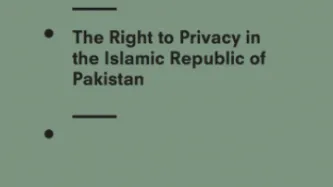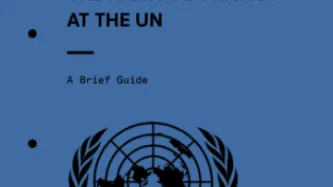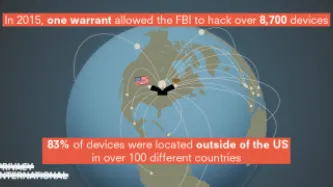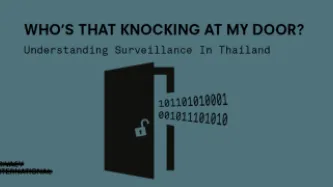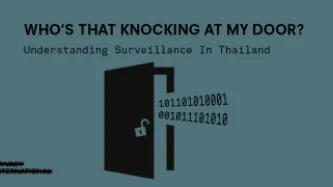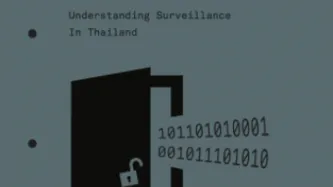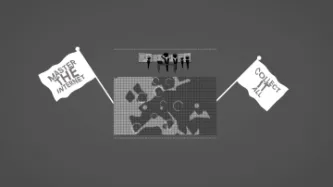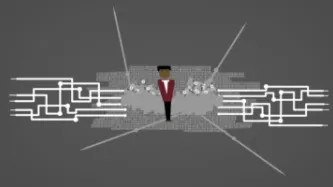Search
Content type: Report
This investigation focuses on the techniques, tools and culture of Kenyan police and intelligence agencies’ communications surveillance practices. It focuses primarily on the use of surveillance for counterterrorism operations. It contrasts the fiction and reality of how communications content and data is intercepted and how communications data is fed into the cycle of arrests, torture and disappearances.
Communications surveillance is being carried out by Kenyan state actors, essentially…
Content type: Report
This stakeholder report is a submission by Privacy International (PI). PI is a human rights organisation that works to advance and promote the right to privacy and ght surveillance around the world. Privacy International wishes to bring concerns about the protection and promotion of the right to privacy for consideration in Pakistan’s upcoming review at the 28th session of the Working Group on the Universal Periodic Review.
Content type: State of Privacy
Introduction
Acknowledgment
The State of Surveillance in Thailand is the result of a collaboration by Privacy International and Thai Netizen Network.
Right to Privacy
The constitution
Thailand experienced a coup d'etat in May 2014. According to Mishari Muqbil and Arthit Suriyawongkul, “their [the junta's] modus operandi seems to be the direct command of ministries and semi-governmental organisations to carry out tasks irrespective of existing legislation.”
Following…
Content type: Long Read
This briefing highlights opportunities for NGOs to raise issues related to the right to privacy before some selected UN human rights bodies that have the mandate and the capacity to monitor and provide recommendations and redress.
The briefing provides some examples based on Privacy International’s experience and points at additional resources and guides. While this guide focuses on the work of NGOs, information to UN human rights mechanisms can be sent by other civil society actors…
Content type: Long Read
In this special briefing for International Women’s Day 2017, we explore through the work of the Privacy International Network some areas of concern being addressed in relation to privacy, surveillance, women’s rights, and gender. Coding Rights demonstrates the important of generating and disseminating gendered content on issues of surveillance in Latin America as a means of inciting informed action. In Chile, Derechos Digitales explored the booming market of mobile applications related to…
Content type: Press release
Privacy International Executive Director Dr Gus Hosein said:
“If today’s leaks are authenticated, they demonstrate what we’ve long been warning about government hacking powers — that they can be extremely intrusive, have enormous security implications, and are not sufficiently regulated. Insufficient security protections in the growing amount of devices connected to the internet or so-called “smart” devices, such as Samsung Smart TVs, only compound the problem, giving governments easier…
Content type: News & Analysis
This guest piece was written by Elonnai Hickok, Amber Sinha and Vanya Rakesh of the Centre for Internet and Society. It does not necessarily reflect the views or position of Privacy International.
In 2009, the Government of India set up the Unique Identification Authority of India (UIDAI) as an attached office of the erstwhile Planning Commission of India via an executive order. The mandate of the UIDAI was to assign a 12-digit unique identification (UID) number (…
Content type: Long Read
Introduction
A growing number of governments around the world are embracing hacking to facilitate their surveillance activities. Yet hacking presents unique and grave threats to our privacy and security. It is far more intrusive than any other surveillance technique, capable of accessing information sufficient to build a detailed profile of a person, as well as altering or deleting that information. At the same time, hacking not only undermines the security of targeted systems, but also has…
Content type: Long Read
This piece was orignally published in Slate in February 2017
In 2015, the FBI obtained a warrant to hack the devices of every visitor to a child pornography website. On the basis of this single warrant, the FBI ultimately hacked more than 8,700 computers, resulting in a wave of federal prosecutions. The vast majority of these devices—over 83 percent—were located outside the United States, in more than 100 different countries. Now, we are in the midst of the first cases…
Content type: News & Analysis
Technologists hoped the “Crypto Wars” of the 1990s – which ended with cryptographers gaining the right to legally develop strong encryption that governments could not break – was behind them once and for all. Encryption is a fundamental part of our modern life, heavily relied on by everything from online banking and online shopping services to the security our energy infrastructure.
However, from comments by the French and German governments about creating a European initiative to circumvent…
Content type: News & Analysis
In our latest report “Who’s that knocking at my door? Understanding surveillance in Thailand”, we highlighted various methods of surveillance that the Thai Government employs. Included in these methods was the finding that Microsoft was the only technology company which by default trusts the Thai Government’s root certificate. Root certificates ensure the validity of a website, and protect users from being tricked into visiting a fake, insecure website. Most technology companies including Apple…
Content type: News & Analysis
An investigation released by Privacy International this week reveals the Facebook shut-down Thailand experienced in May 2014, at the height of the military coup, may have had more to do with attempting to surveil online communications, rather than censoring Facebook users. This revelation indicates there could be more to other previous internet shutdowns that have happened during times of political unrest.
In May 2014, following months of protest, the Thai military overthrew the…
Content type: Report
This investigation looks at how surveillance is being conducted in Thailand. The first part of the investigation focuses on the ties between telecommunication companies and the state, and the second part of the investigation focuses on attacks conducted in order to attempt to circumvent encryption.
Content type: Long Read
The use of IMSI catchers[1] to arrest individuals is rarely documented — as IMSI catchers are used secretively in most countries. The arrest of Colombian drug lord Henry López Londoño in Argentina is therefore a rare opportunity to understand both how IMSI catchers are used, and also the complexity of their extraterritorial use.
In October 2012, Londoño — also known as Mi Sangre (“My Blood”) — was arrested in Argentina. His arrest was the result of cooperation between the Dirección de…
Content type: Long Read
The move to digital payments, without an adequate legal framework, is a double-blow to privacy. India is proving to be the case study of how not to do the move to the cashless society. We are seeing in India the deeper drives to digital: linking financial transactions to identity. On the 8th November, Prime Minister Modi of India announced that 500 and 1,000 rupee notes – 86% of the money supply – would be removed from circulation. The initial justification for this was to tackle the…
Content type: Long Read
In July 2015, representatives of a private company met in a parking lot in Pretoria, South Africa to sell phone tapping technology to an interested private buyer. What they did not know was that this buyer was a police officer. The police had been tipped off that the company was looking to offload the surveillance technology, an IMSI catcher, to anyone who would buy it. It is illegal to operate such surveillance technology as a private citizen in South Africa, and illegal to buy…
Content type: Report
Privacy International’s investigation contains evidence of the Syrian government’s ambitious plans and projects to monitor the national communications infrastructure, the technical details of which are revealed for the first time. Hundreds of original documents also highlight surveillance trade in this region leading up to and during the Arab Spring, which involved companies from around the world.
Content type: News & Analysis
This piece originally appeared in the Responsible Data Forum.
Would you mind if, every time you post a comment on Twitter, Facebook or another social media platform, the police logged it? I mean, it’s public — surely it’s fair game?
If you think that’s OK, then maybe it’s also OK for a police officer to follow you when you walk down a busy street. That’s also public, right?
Clearly, definitions of public and private become very problematic when you are communicating with potentially…
Content type: Press release
Privacy International has today published an investigation, which sheds light on the shady deals that built Syria’s surveillance state and the role Western companies have played in its construction. The investigation also shows how Western surveillance companies seek to exploit loopholes to do business with repressive states.
Key points:
Technical specifications acquired by Privacy International reveal the Syrian government’s ambitious mass surveillance projects, including a nationwide…
Content type: News & Analysis
Brexit and Privacy
It's as clear as mud, what it means when a country decides to willingly pull out of a trading bloc, a policy coordination mechanism, a relatively democratic network, and a framework for the free flow of people, data, and rights. Meanwhile today the minister in charge of surveillance for the past six years will assume the leadership of the country.
There is much speculation as to what is next. Here's our take. Importantly, there's a lot to be worried about, some to like…
Content type: Long Read
Tech firms and governments are keen to use algorithms and AI, everywhere. We urgently need to understand what algorithms, intelligence, and machine learning actually are so that we can disentangle the optimism from the hype. It will also ensure that we come up with meaningful responses and ultimately protections and safeguards.
Many technologists emerge from University, College or graduate courses with the impression that technology is neutral and believe that all systems they apply their…
Content type: News & Analysis
This piece was written by PI Research Officer Edin Omanovic and originally appeared here.
Whatever happens over the next few years, if there is to be a storm, then it is best to prepare. It is essential that western liberal democratic societies are resilient enough to uphold their fundamental values.
One of the UK’s biggest security assets is one of its biggest security threats. The UK’s spies have access to and are allowed to exercise some of the most sophisticated electronic…
Content type: Press release
For further information please contact PI Legal Officer Millie Graham Wood: [email protected]
For media enquiries please contact [email protected]
Documents obtained by Privacy International reveal the existence of a secret oversight function given to the Intelligence Services Commissioner (ISC), in operation since at least 2014. The details of this function, referred to as the ‘third direction’, remain redacted and only came to light following…
Content type: News & Analysis
This guest piece was written by Elonnai Hickok and Vipul Kharbanda of the Centre for Internet and Society. It does not necessarily reflect the views or position of Privacy International.
In light of the complex challenges and threats posed to, and by, the field of information telecommunications in cyberspace, in 1998 the draft resolution in the First Committee of the UN General Assembly was introduced and adopted without a vote (A/RES/53/70)…
Content type: Press release
Caroline Wilson Palow, General Counsel at Privacy International
“The passage of the Investigatory Powers Act is a major blow to the privacy of people in the UK and all over the world. It sets a world-leading precedent, but not one of which the Government should be proud. Instead of reining in the unregulated mass surveillance practices that have for years been conducted in secret and with questionable legal authority, the IPA now enshrines them in law. Widespread surveillance is an antithesis…
Content type: Press release
Privacy International has today written to government ministers, members of the opposition, and oversight bodies reaffirming its call for the UK government to reveal secret intelligence sharing arrangements with the United States.
The original UKUSA agreement — drafted shortly after World War II — allows UK and US agencies to share, by default, any raw intelligence, collection equipment, decryption techniques, and translated documents.
Current arrangements also allow US…
Content type: News & Analysis
Este artículo fue co-escrita con Valeria Milanes de la Asociación por los Derechos Civiles (ADC). Una versión en ingles está disponible aquí.
En Enero de 2015, el sistema de inteligencia de Argentina fue objeto de atención pública luego de la muerte del fiscal Alberto Nisman, debido a la presunta participación de los servicios de inteligencia en dicho suceso. Este escándalo impulsó la reforma del sistema de inteligencia del país.
En Febrero del mismo…
Content type: News & Analysis
The connectivity afforded by the internet has changed the world forever. While the increasing ‘corporatization’ of what many still feel is an open, non-hierarchical, largely uncensored and unfiltered ecosystem, this is increasingly not the case. The emergence of the ‘Internet of Things’ will soon throw into sharp relief who owns the internet and who owns the data we all generate when using the internet. Companies today have a vested interest in portraying their products as safe and…
Content type: Long Read
This piece was written by Ashley Gorski, who is an attorney at the American Civil Liberties Union, and PI legal officer Scarlet Kim and originally appeared in The Guardian here.
In recent weeks, the Hollywood film about Edward Snowden and the movement to pardon the NSA whistleblower have renewed worldwide attention on the scope and substance of government surveillance programs. In the United States, however, the debate has often been a narrow one, focused on the…
Content type: Financial Report
Audited accounts for the year ending January 31 2016.

